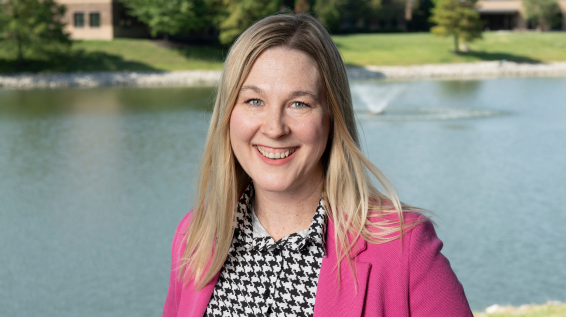
Community Health Network’s Behavioral Health Academy, a talent pipeline and employer-led training program for licensed therapists, has more than exceeded its founders’ expectations. Created during Indiana’s opioid crisis, the original goal of the dual master’s degree program was to grow the state’s supply of health professionals trained and licensed in both addiction and mental health counseling. In four years, the Community BHA has not only grown, but it has also been replicated at more than 15 school sites, producing graduates who are prepared to meet the needs of Indiana communities.
Preparing the pipeline
Several elements aligned to facilitate the creation of the BHA program: the need for more mental health workers in the wake of the opioid crisis; the engagement of Ascend Indiana board member and Community Health Network Foundation President and CEO Joyce Irwin, who had worked with Ascend to launch a talent pipeline for nurses; and grant funding from the Richard M. Fairbanks Foundation. The Ascend team helped bring it all together.
Before the BHA program, Community Health Network’s behavioral health offerings were “very segmented,” said Kathleen Brannen, MSW, LCSW, LCAC, who provided feedback in the development of the BHA and served as the program’s manager from December 2021 until June 2024.
“If someone had an addiction, they had to go to addiction services and only received treatment for that. If they had a mental health problem, they had to go to a mental health counselor.” For a long time, this was the standard of care in Indiana, Brannen said. Yet health care professionals found that there was a need for both types of care. People often experienced both mental health and addiction issues at the same time, and they weren’t being treated fully.
The Ascend team understood this challenge. “Our big takeaway was the need for a substance use curriculum,” said Erica Viar, Ascend Indiana’s vice president of consulting.
Building the program
Armed with a clear sense of Community Health’s needs, Ascend launched a request for proposal, seeking an education partner to come alongside Community and build the new program together.
Social work programs Indiana University Indianapolis and the University of Indianapolis turned out to be a good fit. Next, teams from Ascend, Community and the chosen schools worked together to design the program in a collaborative way. Together, they created a new program that would offer a dual license in both social work and clinical addictions counseling (what behavioral health professionals call “co-occurring focus”). They also built in incentives for students such as paid stipends and robust internship and practicum experiences.
The initial planning work could be challenging, because it required the schools of social work to adapt their curriculum to meet dual licensure, Erica said. “The Ascend team did a lot to pave the way for alignment between our team and the academics in the room,” said Eric Comstock, director of clinical services, adult mental health and addictions for Behavioral Health Services at Community Health Network. “We couldn’t have built the program without them.”
Now almost every behavioral health program in the state of Indiana offers dual licensure, said Jennie Voelker, LCSW, director of clinical services, youth behavioral health services and the BHA for Community Fairbanks Behavioral Health.
Sharing the model
The BHA has broadened its purview to include other types of therapy degrees and is in the process of launching a bachelor’s level program. It also has expanded throughout the state of Indiana, growing more quickly than its founders anticipated and attracting national attention.
Recently the federal government chose the program as a pilot site for Certified Community Behavioral Health Clinics. The national attention and partnership could continue to transform the BHA in “really awesome ways, with more evidence-based practices and more comprehensive care,” Brannen said.
Voelker is proud of Brannen and other graduates of the program, many of whom have gone on to hold leadership positions. “We’re not only training the future workforce,” Voelker said. “We may be training the future leadership of behavioral health statewide.”
The BHA’s new program manager, Tiffany Hatfield, LCSW, LCAC, is a case in point. “The BHA program prepared me for leadership,” Hatfield said. “It gave me confidence in my skills and created a network of peers, partners and opportunities. It has really set me up for this next step in my career.”